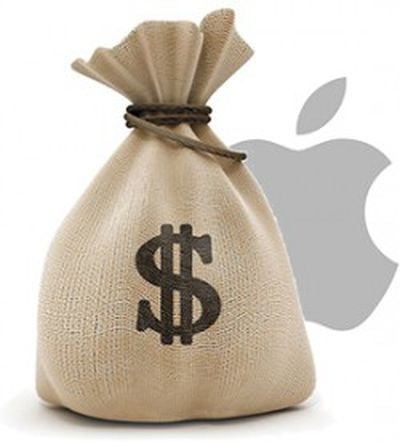 Apple has raised $10 billion in debt through a nine-part bond sale of both fixed and floating rate notes, according to the company's final pricing term sheet filed with the U.S. Securities and Exchange Commission on Friday.
Apple has raised $10 billion in debt through a nine-part bond sale of both fixed and floating rate notes, according to the company's final pricing term sheet filed with the U.S. Securities and Exchange Commission on Friday.
The nine-part sale includes:
- $500 million maturing in 2019 with a floating interest rate based on three month LIBOR plus 8 basis points
- $500 million maturing in 2020 with a floating interest rate based on three month LIBOR plus 20 basis points
- $1 billion maturing in 2022 with a floating interest rate based on three month LIBOR plus 50 basis points
- $500 million maturing in 2019 with a fixed 1.55% interest rate
- $1 billion maturing in 2020 with a fixed 1.9% interest rate
- $1.5 billion maturing in 2022 with a fixed 2.5% interest rate
- $1.75 billion maturing in 2024 with a fixed 3% interest rate
- $2.25 billion maturing in 2027 with a fixed 3.35% interest rate
- $1 billion maturing in 2047 with a fixed 4.25% interest rate
Apple held $246.1 billion in cash and marketable securities last quarter, but around 94% of that money is held overseas and would be subject to high U.S. taxes upon repatriation—something U.S. President Donald Trump plans to change. In the meantime, by raising debt through bonds, Apple can pay for its U.S. operations at a much lower rate, particularly given its low-risk Aa1/AA+ bond credit rating.
Apple typically uses the capital raised to fund dividend payments to shareholders and its share buyback program. Last quarter, Apple returned almost $15 billion to investors through dividends and buybacks. $201 billion of Apple's $250 billion capital return program has been completed. The company also uses the capital for general corporate purposes, such as the repayment of earlier debt and acquisitions.
Note: Due to the political nature of the discussion regarding this topic, the discussion thread is located in our Politics, Religion, Social Issues forum. All forum members and site visitors are welcome to read and follow the thread, but posting is limited to forum members with at least 100 posts.





















Top Rated Comments
So, Apple simply borrows money at a 3% rate, saving 32%.
Example:
Apple needs $10 million for operations in the US...
Apple would need to pull $15.5 million from Ireland, bringing in $10 million after taxes...
OR
Apple can BORROW $10 million at 3% interest, thus paying only $10.3 million
This saves Apple over $5 million.
Government also carries blame for allowing delayed repatriation and not forcing repatriation. I hope the holiday closes the loophole without opening up two new ones.
I think Apple does a lot of crappy things these days, but I can't fault them at all for having done this.
You see, Australia has a corporate tax rate of 30% which is far less than the maximum personal rate of 45% over A$180,000 or 37% over A$87,000. In addition to personal tax Australians also pay sales tax (VAT or GST) of 10%. An individual importer or business that doesn't engage in complex multinational offshore financial schemes will also pay this 10% import tax and pass it on the consumer but they are still liable for 30% on profits made within the country lest they just absorb the 10% themselves.
When Apple sells their computers and other products, most people might think they're liable for at least 10% tax on profits (less than revenue) made in Australia, which is still far less than the official corporate rate of 30%. What they actually pay was found to be less than 1% of revenue in Australia* and the same applies for most other countries.
Considering Apple has average margins of at least 30% as reported in their quarterly statements and reporting obligations, at most they're paying an effective 2-3% tax on income made, and that's being generous! Governments have been allowing this (basically) fraud to go on for years.
This compares to a typical personal burden of 30-50% or more including sales taxes.
I don't know about you but I consider that at least slightly unbalanced (I'm trying to be diplomatic).
I'd be happy if they paid 10% as just an importer. But they pay 3-4 times less than that to the government, and from what I heard Apple is one of the more generous multinationals so I expect far less from others like Microsoft and Google.
Apple and their corporate friends have created the conditions in which Trump thrives, yet they seem to oppose him, which is hypocritical. The public and press should be forthright in pointing this hypocrisy out to Apple and Tim Cook at any opportunity. It's why I'm pessimistic about a Trump administration improving the deal for average workers and probably why such tax havens were proposed.
Apple wants to have its cake and eat it to, and of course they would (and perhaps should). Ultimately, individuals will have to be responsible for taking hold of what threads of democratic power they have if they want to change the situation.
I'm confident there is some hope of a rebalancing, but not from Trump or for that matter Clinton. If it keeps going the way it is, you might understand why authoritarian communism came to power in Russia and China or why socialist governments are common in Europe!